
Europe needs 18 million barrels of oil per day. An immense figure, but already significantly less than the almost 22 million barrels consumed daily in 2008, when the great financial crisis threw the entire world economy into panic[1]. Our continental production, which was 3.5 million barrels per day in 2009, after the UK’s exit from the Union and the Russian oil embargo, has fallen below the half-million per day level[2], but forecasts say that, as early as this winter, our oil needs will drop dramatically – partly due to the fact that it is gradually being replaced by renewable energy and LNG gas[3]. The share of oil supplied by the Russian Druzhba pipeline, which was 2.2 million barrels per day in 2019, has dropped by more than 90 per cent[4].
In their desperate search for alternative supplies, in addition to pushing on the fields discovered in recent years in the Mediterranean, and making agreements (such as the one signed at the end of October between Israel and Lebanon) that until a year ago seemed impossible[5], the countries of Southern Europe have turned first of all to the countries of North Africa (first and foremost Algeria) that have supported the economic and industrial growth of our continent with their supplies for over half a century. Within this framework there is a country, Libya, which alone, up to twenty years ago, supplied 4 million barrels per day and which, due to the civil war, has come to intermittent stops and today cannot exceed a daily production of 1.3 million barrels[6]. A figure that, if peace is achieved in this troubled country, could return to the quantities of the best years in a very short time. It sounds like a simple equation in which everyone gains because Libya lives off oil revenues, but this is not the case.
Because in recent years, not only in Libya, but throughout the Middle East, everything has changed: the local power structure, military power, allies. “The Middle East is the spiritual centre of the three most important monotheistic religions. Given its geopolitical importance, any conflict in the Middle East not only destabilises the region, but the entire world. Therefore, the Middle East is an important centre of world affairs; a politically, economically and culturally sensitive area’[7] , the privileged site of a diplomatic, military and economic confrontation-clash between the Great Powers. The growth in demand for energy from countries such as China, which 50 years ago had only a regional role, has redefined the old balances, with the emergence of contrasts and conflicts of ever greater global importance. This is the case with the series of events referred to as the Arab Spring, of which the Libyan crisis is one of the salient chapters.
The Arab Spring
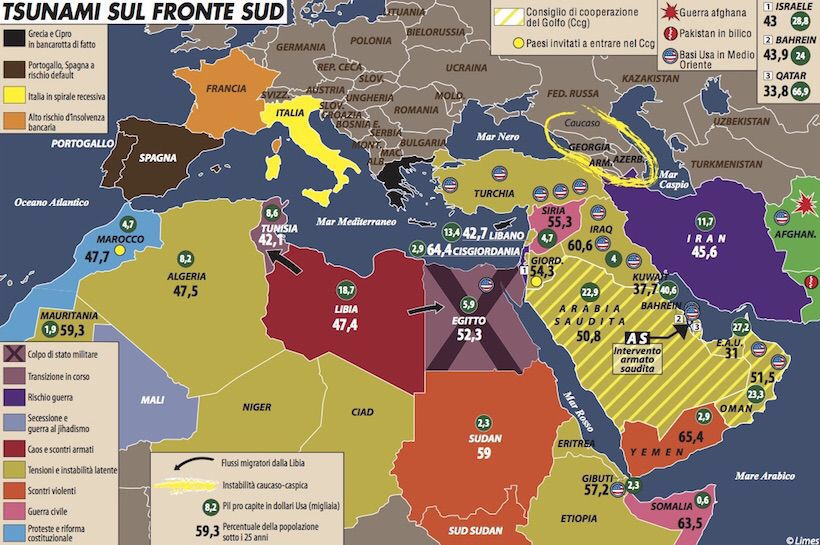
The effects of the Arab Spring on North Africa[8]
We call the ‘Arab Spring’ the series of anti-government protests, uprisings and armed rebellions that have spread across much of the Arab world since 2010, with Tunisia at its epicentre, in response to corruption and economic stagnation[9]. Young people frustrated by unemployment, poverty and lack of a future, but also fed up with autocratic regimes masquerading as theocracies, called for radical change[10].
The protests then spread to Libya, Egypt, Yemen, Syria and Bahrain, leading either to the deposition of many rulers (Zine El Abidine Ben Ali in Tunisia, Muammar Gaddafi in Libya, Hosni Mubarak in Egypt and Ali Abdullah Saleh in Yemen), or to terrible repression: large street demonstrations took place in Morocco, Iraq, Algeria, Lebanon, Jordan, Kuwait, Oman and Sudan, and to a lesser extent in Djibouti, Mauritania, Palestine and Saudi Arabia to the cry ash-shaʻbyurīdisqāṭan-niẓām! (Arabic: الشعبيريدإسقاطالنظام, literally ‘The people want to bring down the regime’)[11].
The wave subsided in mid-2012 due to the brutal response of the authorities[12] to the often violent protests of the demonstrators[13], from which other supra-regional conflicts drew sap: the Syrian civil war[14]; the rise of ISIS, the insurgency in Iraq and the subsequent civil war[15]; the Egyptian crisis, coup d’état and subsequent unrest and uprisings[16]; the Libyan civil war; the Yemen crisis and the subsequent civil war[17]. In addition to physical repression, this time the regimes were forced to restrict access to the Internet[18] and completely block the use of Facebook[19]: even in Arab countries, young people are now using social networks.
The countries overwhelmed by the Arab Spring are those whose oil production is less important, such as the Moroccan monarchy, which was on the verge of being swept away[20]: “The experience of Morocco suggests that greater political freedom, especially freedom of association, can facilitate the emergence of multiple versions of Islam, reducing the relevance of a single large Muslim movement as an umbrella for opposition sentiment. The best means to contain discontent and promote moderation among anti-democratic forces are a pluralist political space and free elections. The dilemmas that the King must now resolve in the face of citizen alienation reveal the limits of a strategy run by a pro-Western autocrat’[21]. But the inability to adapt is the same almost everywhere, as the governments’ only strategy has been to maintain a secularisation of power, as opposed to rebellion movements that identify with Islam[22].
In countries where the reaction of power has been more violent against Islamic fundamentalism (first and foremost Egypt), the power vacuum created by the Arab Spring has led to fierce and belligerent dictatorships that are destabilising not only the Middle East and the Mediterranean, but the entire planet, as happened in Yemen[23] , Bahrain, Syria, Iraq and Libya[24]. These new dictatorships are all strongly influenced (militarily and economically) by foreign powers (such as Egypt, now a Saudi colony) which, especially in Yemen and Libya, are vying for control of the country, supporting bloodthirsty local militias[25]. Libya, in this context, is a special case: after having been one of the world’s largest producers of hydrocarbons (as well as, until the Arab Spring, one of those where prosperity was most widespread), today it is the main departure point for barges of desperate illegal immigrants trying to enter Europe and the symbol of the Turkish attempt to rebuild an empire.
In any case, already in the last period of the Gaddafi regime, China had begun an attempt to infiltrate the country by offering the Rais’ government something like 200 million dollars in arms and ammunition to be used against the rebels, in violation of UN sanctions[26]. The weapons were to be delivered via third countries such as Algeria or South Africa, which did not support the UN nations against Gaddafi[27]. Beijing is famous for the pragmatism of its government, so Chinese support went, during the Arab Spring, to the regimes in power, against the popular uprising[28]. After the dictator’s death, China sought a credible contact for oil supplies, ‘winning over Gaddafi’s successors’[29]. Beijing’s strategy, which is a consequence of the Chinese government’s fear that the uprising could spread even within its borders, was confirmed after the launch of the ‘one Belt one Road’ project, which aims at Chinese military deployment in every part of the world[30] and Chinese industrial expansion in reconstruction and access to Libyan hydrocarbons[31].
The end of Gaddafi
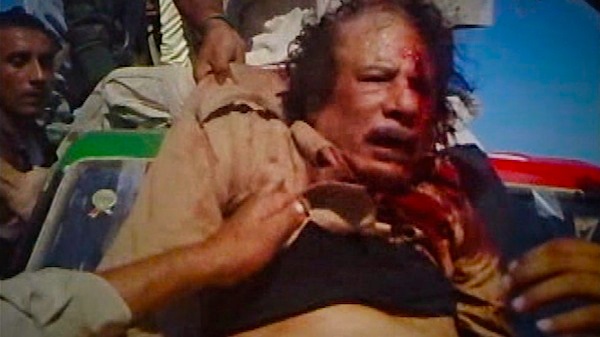
20 October 2011: Colonel Muhammar Gaddafi is killed by rebel troops[32]
The Arab Spring hit Libya on 15 February 2011, when thousands of citizens took to the streets to protest against more than half a century of despotic rule[33]. Those protesting are well organised, even militarily, which leads one to suspect from the outset a Western intelligence operation, given that the French and Americans have been trying for decades to bring down Colonel Muammar Gaddafi’s power[34]: on 18 February 2011, the opposition takes control of most of Benghazi, the country’s second city, which the elite troops and militias promptly sent by the government try in vain to regain[35].
On 20 February 2011, the capital, Tripoli, fell, and on this occasion Saif al-Islam Gaddafi, one of the colonel’s sons, during a televised speech, after admitting the mistakes made by the police and the army in the attempt to deal with the uprising, warned the demonstrators of the risk of plunging the country into a civil war[36] fomented, according to him, by unspecified foreign businessmen[37], which if it led to a fragmentation of the country would put an end to the existence of Libya itself: “Libya has oil and it is oil that has unified Libya… Who has the capacity to manage the oil in Libya? Where will the National Oil Company be based? Tripoli… Baida or Sabha. How can we share the oil?”[38] : words that, in light of current events, were nothing short of prophetic.
The rising death toll soon drew international condemnation and led to the resignation of many Libyan diplomats and the decision to consider Gaddafi the enemy to be overthrown – even for the West[39] : Faced with the reaction of the troops loyal to the Colonel, which led to the reconquest of a large part of the Mediterranean coastline, on 17 March 2011 UN Security Council Resolution 1973[40] was adopted with 10 votes in favour and 5 abstentions (including those of China and Russia[41]) authorising a no-fly zone over Libya and foreign armies to take all ‘necessary measures’[42]to protect civilians.
Two days later, in derogation of §9 of UN Resolution 1970/2011[43] , and in violation of the prohibition enshrined in Article 2. 4 of the UN Charter[44], France, the United States and the United Kingdom began a massive bombing campaign, called Unified Protector, directed against pro-Gaddafi forces with the support of 27 European and Middle Eastern states – justifying the military attack with UN Resolution 1973/2011, one of the most controversial resolutions in the history of the United Nations, which in fact unleashed an international campaign that ended on 31 October 2011 with the capture of Libya’s major cities and the capture of Gaddafi, who was killed on 20 October by militiamen of the National Transitional Council[45].
This does not bring peace. Across Libya there are regime militiamen who have switched to rebel forces, revolutionary brigades who have defected from the Libyan Army, post-revolutionary brigades and various other militias made up of ordinary people, sometimes based on tribal alliances, evolving into criminal networks[46]. Violence, instead of ceasing, is increasing[47]. The NCT, unable to change things, seeking to somehow restore the rule of law, has invited the various armed groups to unite under the aegis of the Ministry of Defence and thus on the payroll of a new national government[48].
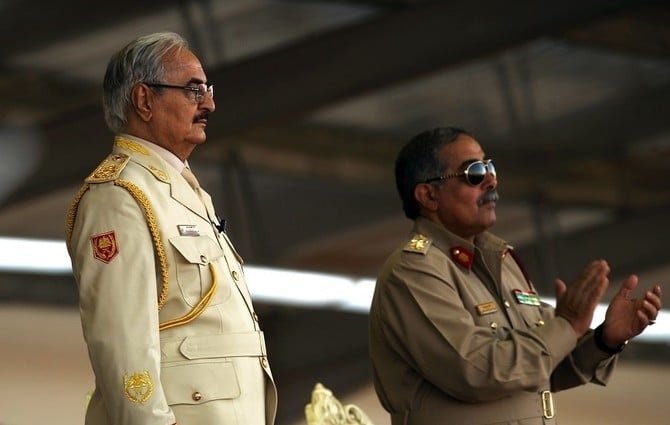
Benghazi, 7 March 2018: Khalifa Haftar (left) and the head of the Libyan army, Abdelrazakal-Nadhuri (right)[49]
This gave legitimacy to many armed groups, including that of General Khalifa BelqasimHaftar, former commander of Gaddafi’s elite troops, who registered his own armed group as the ‘Libyan National Army’, the same name he had used for the anti-Gaddafi forces after the Chadian-Libyan conflict in the 1980s[50]. He has a fictional life behind him: a young and brilliant officer, in 1969 he took part in the coup d’état that brought Gaddafi to power and became a member of the Revolutionary Command Council[51]. Skillful and prudent, he became a senior officer in the Libyan army[52] of which he was Chief of Staff[53].
A layman and follower of the former Egyptian President Nasser[54] , trained at the Soviet military school, he is in command of the Libyan troops that in 1973 (Yom Kippur war), alongside the Egyptian ones, enter the Sinai occupied by Israel[55]. In the late 1980s, Haftar commanded Libyan forces during the Chadian-Libyan conflict. Taken prisoner in 1987, during his imprisonment he formed a contingent of around 2000 Libyan prisoners, the ‘Haftar Force’, equipped by the United States, which assigned him the task of overthrowing the Libyan regime: so he spent almost 20 years in the USA, also obtaining citizenship[56]. In 1993, while living in Vienna (Virginia), a few kilometres away from the CIA headquarter[57], he was sentenced to death in Tripoli, in absentia, for “crimes against the Libyan Jamāhīriyya”[58].
He returned home in 2011 to take part in the uprising against Gaddafi, claiming to be the head of the revolutionary military apparatus: a report denied by the National Transitional Council[59]. However, in April 2011, he became number 3 in the army hierarchy, with the rank of Lieutenant General, alongside Abdal-FattahYunis, Commander-in-Chief of the Rebel Armed Forces, and Omar al-Hariri, Yunis’s Chief of Staff[60]. An army that survives thanks to American support, because the dozens of Libyan tribes, mortally divided by centuries-old hatreds, have no intention of joining a unitary state.
A situation that confuses us in the West, as on 11 September 2012, when Al-Qaeda militants attacked the US consulate in Benghazi[61], killing the US ambassador and three other people: this provoked a popular outcry against the militias and led to the storming of several bases of the Islamist militias by protesters[62]. These actions, together with the repression of the militias[63], led to an unstoppable crescendo of violence that degenerated into the Second Libyan Civil War[64] among:
– Militias loyal to the government of the House of Representatives (or ‘Tobruk government’), which came into being in 2014 following elections and was internationally recognised as the Libyan government until the establishment of the GNA. Strongest in eastern Libya, these militias are backed by Haftar’s Libyan National Army and supported by Egypt and the United Arab Emirates[65] ;
– The militias loyal to the Islamist government of the General National Congress (GNC), also called the government of national salvation, based in the capital, Tripoli, stronger in western Libya and led by the Muslim Brotherhood, supported by the coalition known as the Dawn of Libya and other militias[66], as well as backed by Qatar, Sudan and Turkey[67] ;
– The Islamic Shura Council of Benghazi Revolutionaries, led by Ansar al-Sharia (Libya), supported by the GNC[68] ;
– The provinces of the Islamic State of Iraq and the Levant (ISIS), which control a large part of Cyrenaica[69] ;
– The Tuareg militias of Ghat, which control desert areas in the southwest;
– The local forces of the Misrata district, which control the towns of Bani Walid and Tawergha.
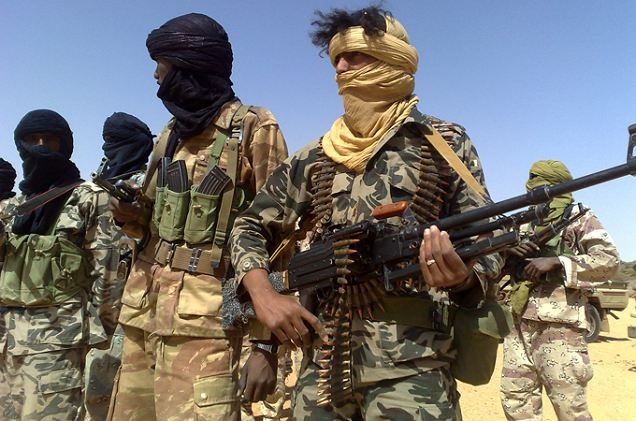
Ghat Tuareg militias in the Fezzan district[70]
In December 2015, thanks to the UN-brokered ceasefire and the 5 April 2016 decision of the Government of Western Libya to suspend operations, the two factions united, at least in principle, to form the GNA (Government of National Accord), recognised and supported by the UN[71], although there was still no agreement on certain nodal points such as the administration of the NOC, the National Oil Corporation – an issue resolved by an agreement reached on 2 July 2016[72]. In spite of this, however, the GNA has not yet obtained the approval of Haftar and his supporters sitting in the government in Tobruk[73] : this is because the GNA has an ambiguous position towards ISIS, which continues to control Cyrenaica[74] , and in any case does not have agreements with many of the tribal militias still active in scattered parts of Libya[75].
A controversial aspect of the policy of FayezAl-Serraj, the man chosen by the West to lead Libya, is his alleged links with the Muslim Brotherhood – confirmed by his alliance with Qatar and Turkey – decidedly disliked by General Haftar[76]. Be that as it may, on 11 September 2016 Haftar, having taken control of two oil terminals[77], found himself in a position to negotiate with the NOC from a position of strength that allowed him to reach an agreement to increase oil production and exports[78] that put all nine of Libya’s main oil terminals in a position to be operational again from January 2017[79].
Some refer to the conflicts since 2011, i.e. since the beginning of the Arab Spring and which are still ongoing, as the Arab Winter. Already more than 10 years ago, Henry Kissinger argued: ‘The Arab Spring is generally discussed in terms of the prospects for democracy. Equally significant is the growing call – most recently in Syria – for outside intervention to bring about regime change, overturning prevailing notions of international order. If the objective is limited to deposing a specific ruler, a new civil war could break out in the resulting vacuum, with armed groups vying for succession and outside countries choosing different sides’[80].
The Arab Winter in Libya
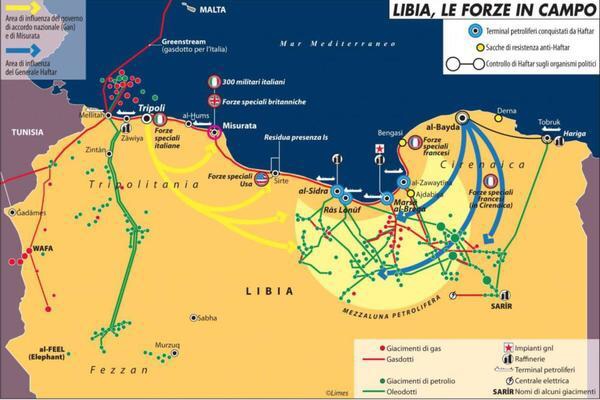
The forces on the ground in Libya (December 2016)[81]
A decade later, we have to recognise that Richard Nixon’s former Secretary of State was right. In May 2018, only the uprising in Tunisia had led, at least on the surface, to a transition towards a democratic government, which was already in crisis: the referendum of 25 July 2022, in fact, which saw the country adopt a new Constitution that changed the political system and formalised the gradual process of centralisation of powers led by President KaïsSaïed[82], does not bode well for the future, either in an economic or social sense[83].
Even today, there are multiple conflicts that have arisen from the Arab Spring. The Syrian civil war, for example, has caused tens of thousands of deaths and displaced people, and consequently massive political instability and economic difficulties, with the Syrian pound plummeting to historic lows[84]; in Lebanon, the banking crisis is threatening the country’s economy (which has a public debt of 495% of GDP and a currency devaluation of 90%)[85]; Yemen, the civil war continues to bleed the country[86], while in Libya, a bloody civil war has (for now) ended, with the West and Russia sending fighters to win it[87].
At the beginning of 2018, the forces on the ground in Libya are as follows:
– The UN-recognised government, supported by the international community and diplomatically by Italy (interested in decreasing migration through agreements with Tripoli) by Qatar and Turkey – that of FayezAl-Serraj and the GNA, based in Tripoli;
– General Haftar and his army, the Libyan National Army (LNA) firmly in control of Cyrenaica (based first in Tobruch and then in Benghazi) and supported by France (which saw in Haftar a champion for the elimination of terrorism), Egypt (allied to fight ISIS), the United Arab Emirates (for obvious oil interests) and Russia[88]. Russia fights with Wagner Group mercenaries[89], infamous for their ferocity[90], and sends weapons and fighter planes[91].
This is a novelty since in the previous attacks on the Gaddafi regime, the nations that bombed the country were France and the United States who now, in this second Libyan civil war, only intervene to attack the marauders who try to steal oil from the deposits that supply the West[92]. From 2018 onwards, much of the conflict is being fought by drones, which come from the United Arab Emirates and, to a massive extent, from Turkey, whose commitment has been paid for with licences to exploit oil deposits in the Mediterraneao, off the island of Crete[93]. In April 2019, General Haftar’s troops resumed their westward march, bringing them to within a hundred kilometres of Tripoli, until the equivalence of forces on the ground led to a stalemate[94].
It should be noted that only the entry of Turkey saved the GNA, a GNA that was about to succumb[95]. The situation on the battlefield is paradoxical: despite the UN embargo on arms supplies, Libya is the recipient of weapons from the major industrial powers, and violations are evident on both sides of the conflict[96]. President Erdogan is the only one to have negotiated not in exchange for money, but in exchange for an agreement on redefining the borders of Libyan territorial waters, creating a special maritime economic zone between Libya and Turkey[97]. The agreement is a blatant sign of defiance towards Greece and, therefore, the European Union, as it violates the principles of Greek maritime sovereignty, thanks to which Ankara assumes an advantageous position on the exploitation of Libyan oil resources and future exploration in that part of the Mediterranean[98].
Who controls Libyan oil?
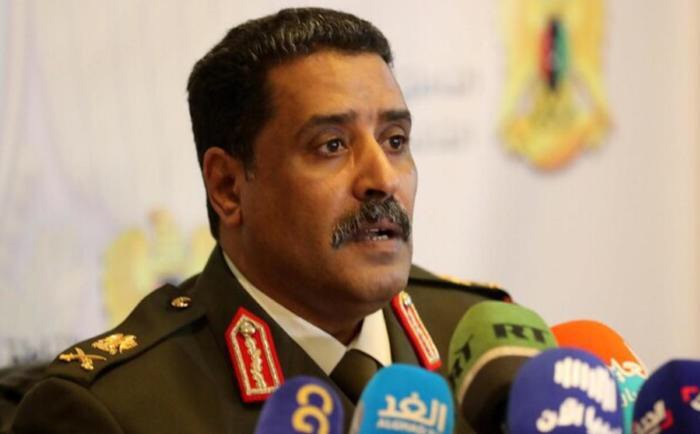
Brigadier General Ahmed al-Mismari, LNA spokesman[99]
Hydrocarbons are Libya’s only wealth (48 billion barrels of reserves, among the largest in Africa) so that the deposits, besides being the uniting factor of the Libyan tribes, are the object of pressure in the civil war, sending supplies to Europe into a tailspin and causing the price per barrel to skyrocket on the financial markets[100]. The latest ‘attack’ on the wells was in April 2021, when the Sharara wells (in the desert south of Tripoli) were closed because employees of the former state mining company, the NOC, were threatened[101].
This has been happening systematically since the fall of Gaddafi, often at the initiative of militias loyal to Haftar or mercenaries from the Wagner Group[102]. Since the beginning of the second civil war, the decrease in production has led to exports of between 365,000 and 409,000 barrels per day, which means a decrease of 865,000 barrels per day compared to production under ‘normal circumstances’, as officially announced by the NOC in early July 2022[103].
The total halt was only averted by diplomatic intervention by the United Nations, the United States, France and Egypt[104]. NOC chairman Mustafa Sanallah has long called for the creation of an NOC military force capable of defending oil fields, pipelines and export terminals[105]. Sanallah also denounced the deployment of Russian mercenaries from Wagner[106]: “Libya’s oil is for the Libyan people. I completely reject attempts by foreign countries to prevent the resumption of oil production […] We do not need Russian and other foreign mercenaries in Libya’[107].
The game Russia is playing in Libya, as it emerged in September 2022, is to boycott supplies to the West, and to conquer the wells of Cyrenaica once and for all, which would allow Putin to circumvent the embargo against Russian hydrocarbons for the invasion of Ukraine[108]. In August 2022, Russia’s state oil group Zarubezhneft sent a delegation to Libya at the invitation of the Arabian Gulf Oil Co (AGOCO), a subsidiary of the NOC that operates many important infrastructures, including the Tobruk terminal[109]. The mission, which arrived in Benghazi (the city from which General Haftar dominates Cyrenaica with the support of Wagner’s mercenaries), closed the meeting with the signing of a preliminary memorandum that provides for[110]: a) the launch of exploration campaigns on new fields in Sarir and Masala (with a combined capacity of 350. 000 barrels per day); b) the extension of Libyan-Russian collaboration to the construction of ‘joint storage infrastructures’: a disturbing project, because it raises suspicions of the possibility of ‘triangulation’ of Russian crude oil to European markets – something that, according to Bloomberg, has already happened at the El Hamra terminal[111].
NOC is however in the hands of General Haftar: in July, the chairmanship of NOC passed to Farhat Omar Bengdara, one of the general’s closest advisors, whose appointment was interpreted as the first step of a political understanding[112]. An understanding confirmed by another of Haftar’s loyalists, Brigadier General Ahmed al-Mismari, who declared ‘We protect 90 per cent of Libya’s oil’, i.e. those nine-tenths of the oil produced in the area protected by the Libyan National Army (LNA) of which Khalifa Haftar is Commander-in-Chief[113]. ‘The gas that is imported from Italy, on the other hand, is outside the area we protect,’ Mismari recalled[114]. This gives the measure of Haftar’s blackmail capacity. At the end of October 2022, NOC reported that daily oil production had returned to 1.2 million barrels per day, but the question at this point is: for how much longer?
[1]https://www.statista.com/statistics/332050/total-oil-daily-consumption-in-europe/
[2]https://www.statista.com/statistics/265206/oil-production-in-the-european-union-in-barrels-per-day/
[3]https://ec.europa.eu/eurostat/statistics-explained/index.php?title=Oil_and_petroleum_products_-_a_statistical_overview&oldid=315177
[4]https://www.reuters.com/world/europe/how-much-oil-does-european-union-import-russia-2022-04-06/
[5]https://edition.cnn.com/2022/10/27/middleeast/israel-lebanon-sign-gas-deal-intl/index.html
[6]https://www.aa.com.tr/en/energy/energy-projects/libya-eyes-62-oil-output-rise-to-21-million-barrels-per-day/32897
[7]“Conflict and Diplomacy in the Middle East – External Actors and Regional Rivalries”, Edited by Yannis A. Stivachtishttps://www.e-ir.info/wp-content/uploads/2018/11/Conflict-and-Diplomacy-in-the-Middle-East-E-IR.pdf
[8]https://www.limesonline.com/le-migliori-15-carte-sulla-primavera-araba/25984
[9]https://www.reuters.com/article/tunisia-protests-bouazizi-idAFLDE70G18J20110119 ; http://www.payvand.com/news/11/feb/1080.html
[10]P. Manfreda ,”The Reasons for the Arab Spring, The Root Causes of the Arab Awakening in 2011”, Pag.135https://phd-dissertations.unizik.edu.ng/repos/81282590950_151185619167.pdf ; https://www.thoughtco.com/the-reasons-for-the-arab-spring-2353041
[11]https://www.huffpost.com/entry/what-is-the-arab-third-es_b_832628
[12]https://www.reuters.com/article/us-morocco-protests-idUSTRE74L2YK20110522 ; https://web.archive.org/web/20111026093919/http:/www.irishtimes.com/newspaper/opinion/2011/0531/1224298143757.html ; https://www.cbsnews.com/news/bahrain-troops-lay-siege-to-protesters-camp/
[13]https://english.ahram.org.eg/NewsContent/2/0/10315/World/0/Syria-clampdown-on-protests-mirrors-Egypts-as-thug.aspx ; https://www.washingtonpost.com/world/yemeni-government-supporters-attack-protesters-injuring-hundreds/2011/03/16/AB56R9g_story.html ; https://web.archive.org/web/20110301043128/http:/www.huffingtonpost.com/2011/02/24/libya-protests-gaddafi-fo_n_827568.html
[14]PhilKarber, (2012). “Fear and Faith in Paradise”; https://www.americamagazine.org/issue/culture/arab-winter
[15]https://www.jpost.com/Middle-East/Analysis-Arab-Winter-is-coming-to-Baghdad-359348
[16]https://www.euronews.com/2013/02/08/egypt-and-tunisia-s-new-arab-winter
[17]https://www.middleeasteye.net/news/yemens-arab-winter
[18]https://www.telegraph.co.uk/news/worldnews/africaandindianocean/egypt/8287737/Egypt-protests-internet-service-disrupted-before-large-rally.html
[19]https://aisel.aisnet.org/cgi/viewcontent.cgi?article=1482&context=sprouts_all
[20]https://www.journalofdemocracy.org/articles/tracking-the-arab-spring-why-the-modest-harvest/ ; https://www.journalofdemocracy.org/wp-content/uploads/2013/10/Brown-24-4.pdf ; https://www.journalofdemocracy.org/articles/resilient-royals-how-arab-monarchies-hang-on/ ;
[21]https://www.journalofdemocracy.org/articles/moroccos-elections-the-limits-of-limited-reforms/
[22]https://www.journalofdemocracy.org/wp-content/uploads/2013/04/Stepan-24-2.pdf ; https://www.journalofdemocracy.org/wp-content/uploads/2012/04/Nasr-16-2.pdf
[23]https://www.newyorker.com/magazine/2018/04/09/a-saudi-princes-quest-to-remake-the-middle-east
[24]https://repository.library.georgetown.edu/bitstream/handle/10822/1042998/TheMuslimWorld_CIRS_Special_Issue_Intro_January2017.pdf?sequence=1&isAllowed=y
[25]https://www.e-ir.info/wp-content/uploads/2018/11/Conflict-and-Diplomacy-in-the-Middle-East-E-IR.pdf
[26]https://www.nytimes.com/2011/09/05/world/africa/05libya.html
[27]https://www.nytimes.com/2011/09/05/world/africa/05libya.html
[28]https://www.nytimes.com/2011/09/05/world/africa/05libya.html
[29]https://thediplomat.com/2011/09/did-china-sell-arms-to-libya/ ; https://thediplomat.com/2011/08/we-will-respect-libya-choices/
[30]“For example, the construction in April 2016 of the first overseas naval base in Doraleh, an extension of the port of Djibouti, provides China with access to maritime routes distant from Chinese territory that have allowed the PLA Navy to establish a presence in the Red Sea, thus also moving closer to the Mediterranean Sea. The robust logistics provided by the BRI also allows China to support its military power from a distance” https://www.ispionline.it/it/pubblicazione/fact-checking-bri-la-nuova-della-seta-23784
[31]https://www.limesonline.com/la-cina-in-nordafrica-4-la-libia-e-i-limiti-della-non-ingerenza/118882
[32]https://groundviews.org/2011/10/30/sri-lanka-and-the-death-of-muammar-gaddafi/
[33]Ronald Bruce St. John, “Libya: From Colony to Revolution”, Oxford,Oneworld2010, pages 278-284
[34]Ronald Bruce St. John, “Libya: From Colony to Revolution”, Oxford,Oneworld2010, pages 81-180
[35]https://www.reuters.com/article/idINIndia-55032320110221
[36]https://www.reuters.com/article/idINIndia-55032320110221
[37]https://www.reuters.com/article/idINIndia-55032320110221
[38]https://www.reuters.com/article/idINIndia-55032320110221
[39]https://www.reuters.com/article/libya-protests-interim-idUSLDE71P0GU20110226
[40]https://tind-customer-undl.s3.amazonaws.com/045ded51-0631-4b9e-9d86-9169e3e606b1?response-content-disposition=attachment%3B%20filename%2A%3DUTF-8%27%27S_RES_1973%25282011%2529-EN.pdf&response-content-type=application%2Fpdf&X-Amz-Algorithm=AWS4-HMAC-SHA256&X-Amz-Expires=86400&X-Amz-Credential=AKIAXL7W7Q3XFWDGQKBB%2F20221023%2Feu-west-1%2Fs3%2Faws4_request&X-Amz-SignedHeaders=host&X-Amz-Date=20221023T082225Z&X-Amz-Signature=c2edf9755aaa7ca86db6cb032a31c50d2f0ae7e80a544c75f95d226c1ed76db5
[41]https://lospiegone.com/2019/05/23/tra-risoluzioni-e-missioni-le-nazioni-unite-in-libia/
[42]http://www.vita.it/static/upload/attach/7c37f762d305855e8e11cfbff5e57f78.pdf
[43]https://unipd-centrodirittiumani.it/public/docs/Security_Council_Res1970_2011_2.pdf
[44]“I membri devono astenersi nelle loro relazioni internazionali dalla minaccia o dall’uso della forza, sia contro l’integrità territoriale o l’indipendenza politica di qualsiasi Stato, sia in qualunque altra maniera incompatibile con i fini delle Nazioni Unite” art.2.4 Carta dell’ONU https://treaties.un.org/doc/publication/ctc/uncharter.pdf
[45]https://groundviews.org/2011/10/30/sri-lanka-and-the-death-of-muammar-gaddafi/
[46]https://www.rand.org/content/dam/rand/pubs/research_reports/RR500/RR577/RAND_RR577.pdf ; https://www.files.ethz.ch/isn/154683/SAS-WP12-After-the-Fall-Libya.pdf
[47]https://www.rand.org/content/dam/rand/pubs/research_reports/RR500/RR577/RAND_RR577.pdf ; https://www.nytimes.com/2011/11/02/world/africa/in-libya-the-fighting-may-outlast-the-revolution.html ; https://www.telegraph.co.uk/news/worldnews/africaandindianocean/libya/8860684/Libya-revolutionaries-turn-on-each-other-as-fears-grow-for-law-and-order.html
[48]https://carnegieendowment.org/2014/09/24/ending-libya-s-civil-war-reconciling-politics-rebuilding-security-pub-56741
[49]https://www.arabnews.com/node/1318056/amp
[50]https://www.huffpost.com/entry/americas-own-war-criminal-in-libya_b_57a851f4e4b034b258956cc6
[51]https://web.archive.org/web/20140522195828/https://www.middleeastmonitor.com/articles/africa/11606-khalifah-haftar-a-new-al-sisi-in-libya
[52]https://web.archive.org/web/20140828011915/http://www.bbc.com/news/world-africa-27492354
[53]https://web.archiv.e.org/web/20140519065411/http://www.philly.com/philly/news/nation_world/20140518_ap_b37be9896df04792a20297c0f382ce3b.html?c=r
[54]https://web.archive.org/web/20140522195828/https://www.middleeastmonitor.com/articles/africa/11606-khalifah-haftar-a-new-al-sisi-in-libya
[55]https://www.ft.com/content/0b4a3e30-e0f8-11e3-875f-00144feabdc0 ; https://theworld.org/stories/2019-04-10/libyan-warlord-took-twisted-path-tripoli
[56]https://www.nytimes.com/2014/05/28/opinion/the-new-danger-in-benghazi.html?action=click&contentCollection=Opinion®ion=Footer&module=MoreInSection&pgtype=article
[57]https://www.democracynow.org/2011/3/29/a_debate_on_us_military_intervention
[58]https://eng.majalla.com/node/90206/khalifa-haftar-the-libyan-general%C2%A0in-a-battle-for-control-of-the-capital%C2%A0
[59]https://www.theguardian.com/world/2011/apr/03/libya-rebel-leadership-split
[60]https://www.economist.com/middle-east-and-africa/2011/05/19/the-colonel-feels-the-squeeze ; https://www.bbc.co.uk/blogs/newsnight/markurban/2011/04/the_task_of_forming_a_more_eff.html
[61]https://ballotpedia.org/Terrorist_attack_on_U.S._mission_in_Benghazi,_2012Schuchter, Arnold (2015). “Isis Containment & Defeat: Next Generation Counterinsurgency”; https://ruor.uottawa.ca/bitstream/10393/35286/1/MYERS,%20Laurel%2020165.pdf
[62]https://www.washingtonpost.com/world/asia_pacific/libya-militia-leader-heat-seeking-missiles-other-weapons-stolen-during-firefight/2012/09/24/8ab6f992-0675-11e2-afff-d6c7f20a83bf_story.html ; https://web.archive.org/web/20120924035749/http:/english.alarabiya.net/articles/2012/09/21/239416.html
[63]https://www.aljazeera.com/news/2012/9/23/libyan-forces-raid-militia-outposts
[64]https://web.archive.org/web/20150320232806/http://www.conflict-news.com/libyas-second-civil-war-how-did-it-come-to-this/ ; https://nationalpost.com/opinion/national-post-view-stabilizing-libya-may-be-the-best-way-to-keep-europe-safe
[65]https://nationalpost.com/opinion/national-post-view-stabilizing-libya-may-be-the-best-way-to-keep-europe-safe
[66]https://www.theguardian.com/world/2014/aug/29/-sp-briefing-war-in-libya ; https://carnegieendowment.org/2014/10/06/libya-s-legitimacy-crisis/hr9j
[67]https://nationalpost.com/opinion/national-post-view-stabilizing-libya-may-be-the-best-way-to-keep-europe-safe ; https://www.economist.com/briefing/2015/01/10/that-it-should-come-to-this
[68]https://www.libyaherald.com/2014/11/omar-al-hassi-in-beautiful-ansar-row-while-100-gnc-members-meet/#axzz3cnd2kDDR
[69]https://www.libyaherald.com/2014/11/omar-al-hassi-in-beautiful-ansar-row-while-100-gnc-members-meet/#axzz3cnd2kDDR
[70]https://nena-news.it/libia-nel-fezzan-dimenticato-si-gioca-la-stabilita-libica/
[71]https://foreignpolicy.com/2015/03/06/libya-civil-war-tobruk-un-negotiations-morocco/
[72]https://www.reuters.com/article/us-libya-security-politics-idUSKCN0X22KG
[73]https://www.bloomberg.com/news/articles/2016-07-03/libya-oil-chiefs-reunify-state-producer-to-end-row-on-exports?leadSource=uverify%20wall
[74]https://www.changethefuture.it/informazione/guerra-libia/
[75]https://www.changethefuture.it/informazione/guerra-libia/
[76]https://www.changethefuture.it/informazione/guerra-libia/ ; https://insideover.ilgiornale.it/politica/linternazionale-dei-fratelli-musulmani-spinge-su-tripoli.html
[77]https://www.bloomberg.com/news/articles/2016-07-03/libya-oil-chiefs-reunify-state-producer-to-end-row-on-exports?leadSource=uverify%20wall
[78]https://web.archive.org/web/20170116160402/https:/www.bloomberg.com/news/articles/2016-09-12/libya-s-oil-comeback-derailed-as-former-general-seizes-ports
[79]https://web.archive.org/web/20170202113443/https:/www.bloomberg.com/news/articles/2016-11-16/libya-to-nearly-double-oil-output-as-opec-s-task-gets-harder
[80]https://www.washingtonpost.com/opinions/syrian-intervention-risks-upsetting-global-order/2012/06/01/gJQA9fGr7U_story.html
[81]http://www.limesonline.com/haftar-a-mosca-la-russia-in-libia/95627
[82]La Tunisia attraversa una grave crisi politica dal 25 luglio 2021, quando Saied ha avviato una serie di misure eccezionali, principalmente relative alla destituzione del governo e alla nomina di un nuovo esecutivo, allo scioglimento del Consiglio superiore della magistratura e del Parlamento, legiferando con decreti presidenziali. Il presidente tunisino ha inoltre promulgato una nuova Costituzione e annunciato elezioni legislative anticipate.
Diverse forze politiche e sociali tunisine respingono i provvedimenti di Saied, che considerano “un colpo di stato contro la Costituzione” del 2014 e una consacrazione del potere assoluto e individuale”.https://www.africarivista.it/tunisia-saied-presenta-il-decreto-sulle-prossime-elezioni/206929/
[83]https://www.ispionline.it/it/pubblicazione/tunisia-transizione-democratica-rischio-36210
[84]https://www.theguardian.com/world/2020/jun/12/us-caesar-act-sanctions-and-could-devastate-syrias-flatlining-economyUS
[85]https://www.reuters.com/markets/rates-bonds/penny-pinching-power-cuts-lebanons-middle-class-squeezed-by-crisis-2022-01-23/
[86]https://www.arabnews.com/node/1688576/middle-east ; https://www.bbc.com/news/world-middle-east-29319423
[87]https://www.independent.co.uk/voices/libya-war-haftar-tripoli-russia-putin-us-turkey-a9557136.html ; https://www.independent.co.uk/news/world/africa/libya-war-tripoli-haftar-russia-turkey-gna-a9554976.html
[88]https://www.limesonline.com/haftar-e-la-russia/96328
[89]WAGNER GROUP: I FANTASMI DI MORTE SCATENATI DAL CREMLINO | IBI World Italia
[90]https://www.repubblica.it/esteri/2019/11/06/news/russia_libia_mercenari_haftar-240367691/
[91]https://www.repubblica.it/esteri/2020/05/21/news/escalation_in_libia_la_russia_trasferisce_8_aerei_da_caccia-257250590/
[92]https://www.repubblica.it/esteri/2019/11/06/news/russia_libia_mercenari_haftar-240367691/
[93]https://www.repubblica.it/esteri/2019/11/06/news/russia_libia_mercenari_haftar-240367691/
[94]https://www.changethefuture.it/informazione/guerra-libia/
[95]https://www.osservatoriodiritti.it/2020/05/26/guerra-in-libia/ ; https://www.ispionline.it/it/print/pubblicazione/perche-la-turchia-interviene-libia-24800
[96]https://www.osservatoriodiritti.it/2020/05/26/guerra-in-libia/ ; https://www.ispionline.it/it/print/pubblicazione/perche-la-turchia-interviene-libia-24800
[97]https://www.osservatoriodiritti.it/2020/05/26/guerra-in-libia/ ; https://www.ispionline.it/it/print/pubblicazione/perche-la-turchia-interviene-libia-24800
[98]https://www.osservatoriodiritti.it/2020/05/26/guerra-in-libia/ ; https://www.ispionline.it/it/print/pubblicazione/perche-la-turchia-interviene-libia-24800
[99]https://www.ansa.it/canale_ambiente/notizie/energia/2022/09/15/libia-portavoce-di-haftar-proteggiamo-il-90-del-petrolio_f2dea28e-0672-4ddd-9865-3f6f97226ecf.html
[100]https://www.repubblica.it/esteri/2022/07/03/news/libia_pozzi_di_petrolio_ostaggio_della_guerra_civile_tra_aggressioni_e_poca_produttivita-356356990/amp/
[101]https://www.repubblica.it/esteri/2022/07/03/news/libia_pozzi_di_petrolio_ostaggio_della_guerra_civile_tra_aggressioni_e_poca_produttivita-356356990/amp/
[102]https://www.repubblica.it/esteri/2022/07/03/news/libia_pozzi_di_petrolio_ostaggio_della_guerra_civile_tra_aggressioni_e_poca_produttivita-356356990/amp/
[103]https://www.agenzianova.com/news/libia-la-noc-comunica-limpossibilita-a-fornire-prodotti-raffinati-per-soddisfare-la-domanda/ ; https://www.repubblica.it/esteri/2022/07/03/news/libia_pozzi_di_petrolio_ostaggio_della_guerra_civile_tra_aggressioni_e_poca_produttivita-356356990/amp/
[104]https://formiche.net/2020/06/noc-petrolio-libia/
[105]https://formiche.net/2020/06/noc-petrolio-libia/
[106]https://formiche.net/2020/06/russia-sharara-sirte/
[107]https://formiche.net/2020/06/noc-petrolio-libia/
[108]https://www.repubblica.it/esteri/2022/09/14/news/libia_petrolio_energia_russia_noc-365605017/
[109]https://www.repubblica.it/esteri/2022/09/14/news/libia_petrolio_energia_russia_noc-365605017/
[110]https://www-africaintelligence-com.translate.goog/north-africa/2022/09/01/west-worried-as-agoco-zarubezhneft-rapprochement-picks-up-pace,109808477-eve?_x_tr_sl=en&_x_tr_tl=it&_x_tr_hl=it&_x_tr_pto=sc ; https://libyaalahrar.net/noc-chairman-invites-russias-zarubezhneft-to-libya-africa-intelligence-reports/ ;https://www.repubblica.it/esteri/2022/09/14/news/libia_petrolio_energia_russia_noc-365605017/
[111]https://www.bloomberg.com/news/articles/2022-08-03/russia-finds-a-new-route-to-oil-market-via-a-tiny-egyptian-port
[112]https://www.repubblica.it/esteri/2022/09/14/news/libia_petrolio_energia_russia_noc-365605017/
[113]https://www.ansa.it/canale_ambiente/notizie/energia/2022/09/15/libia-portavoce-di-haftar-proteggiamo-il-90-del-petrolio_f2dea28e-0672-4ddd-9865-3f6f97226ecf.html
[114]https://www.ansa.it/canale_ambiente/notizie/energia/2022/09/15/libia-portavoce-di-haftar-proteggiamo-il-90-del-petrolio_f2dea28e-0672-4ddd-9865-3f6f97226ecf.html
Leave a Reply